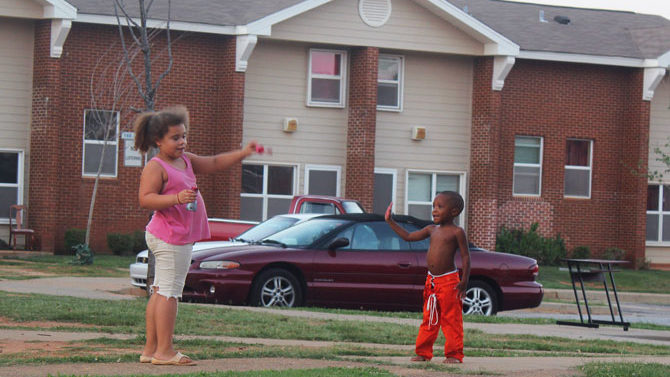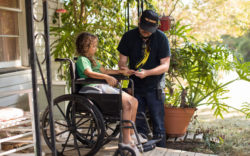Kyle Dvorak sees it as a stepping stone. The 34-year-old mother of two—Jeremy, 5, and Eden, 8—has lived in Nellie B Homes in East Athens for a year and eight months. She’s looking for a job and says living in an apartment owned by the Athens Housing Authority is one way she and her kids can make ends meet until she can find something better.
“It’s a way to get on your feet,” she says while watching her kids play with neighbors in the cul-de-sac. “Some people take it as a permanent thing… [but] I wouldn’t mind having a nice house for the kids, and a yard.”
Dvorak is one of thousands of Athens residents whose incomes are so low that they qualify for subsidized housing. With a rental market that caters to students—University of Georgia students are one-third of the Athens population, and 23,688 are renters—competition is fierce to find safe and affordable housing, according to the Athens-Clarke Human and Economic Development Department.
Subsidized apartment complexes create pockets of concentrated poverty and crime throughout the county. But many residents already in subsidized housing, along with experts interviewed by Flagpole, say the low rents, mainly at AHA properties, create a sense of stability among families who are typically less than a paycheck away from being homeless.

Shanita Hall sits with her sons Kemarie, 4, and De’juan Elliott, 3, outside their apartment in the Broadacres neighborhood off Broad Street near downtown Athens.
“If I get fired, my rent will go down like $50. But in regular apartments, you pay the same amount,” says Shanita Hill, who lives in Broadacres Homes with her two boys, Kenmarie, 4, and De’juan, 3. The family moved in almost two years ago after living in a trailer park outside of town. Now closer to schools and work, Hill says she feels more secure with the new apartment, one of 1,255 managed by the AHA in neighborhoods across the city.
Low-income housing doesn’t create poverty; rather, it goes along with simply having low-income families living in Athens, says Kim Skobba, a UGA College of Family and Consumer Sciences professor.
“People living in poverty need housing that’s affordable, so they go together. I think the idea that housing holds people down, or creates poverty, is a misguided notion,” says Skobba, who specializes in migration patterns of low-income populations. When families don’t have access to subsidized housing they move, on average, once every 10 months.
“There are many more poor people here than we have in subsidized housing, and I can say that without even looking at the numbers,” she says. “Nationally, one in every four households that is eligible for housing assistance has access to it. There are long waiting lists for public housing. The housing safety net is, in general, decreasing.”
A Growing Problem
More than 11,000 families can’t find affordable housing in Athens, according to HED. The poorest of the poor—the 2,475 Athens households who bring home less than $7,500 a year—have the hardest time finding decent, affordable places to live, with nearly three-quarters of the families living in rental units that lack a complete kitchen or plumbing, or are more expensive than what they can afford.
In addition to public housing, HED estimates about 500 residents receive Section 8 vouchers, and about 350 apartments are subsidized by tax credits that offer cheap rents to tenants who make less than 60 percent of the Athens median income, or about $36,000 for a family of four. (The U.S. Department of Housing and Urban Development defines a low-income family as one that earns less than 80 percent of the median income for the area.)
Those affordable units are in more demand as families continue to struggle with a down economy. Middle-class families, after one wage earner loses a job, find themselves falling below the poverty level and struggling to pay their rent or their mortgage, says Winston Heard, executive director of the nonprofit East Athens Development Corp. He often sees five homeowners a day in his office, where he counsels residents to help them stay in their homes, and he says this newly impoverished population adds a new dimension to the low-income housing market.
“Now, what used to be the middle income is falling down to lower income because one (earner) lost his or her job,” he says. “And now, that safety net is being stretched to include a lot more people, and it’s also including a lot more qualified people. They have job training. They are sophisticated enough to come in here and look for help… These are the people who are coming in through the door now, and it’s also pushing those other people down.”
And in today’s job market, if you recently lost your job, Heard says, it’s easier to pull yourself back up and get back into the game. But young parents who never graduated from high school first have to prove to an employer that they’re viable employees. That’s tough in this economy, he says. Skobba also notes the economy’s role in the local poverty rate, which, at about 37 percent, according to the U.S. Census Bureau, is among the highest in the nation for a county the size of Clarke. For example, the number of public housing units hasn’t changed since 1990, but poverty has nearly doubled in that time.
“This is deeper and wider than we thought, and you need to hold on just to keep the doors open,” Heard says. “There are some good stories. People are holding on. Because the government can’t do everything and shouldn’t.”
Options Exist
For low-income families in Athens, there are three main routes for finding affordable housing, other than simply looking for a cheap place on the open market. The AHA offers city-owned apartments of various sizes with rents based on income level. The majority of tenants—75 percent—are retired or work a low-paying job, says spokeswoman Marilyn Appleby, and the average tenant stays for about five years. The Housing Authority pays for all its operating expenses from tenants’ rents and federal HUD subsidies, and pays the city about $95,000 a year in lieu of property taxes.
With a waiting list for public housing of about 900 families, another option is to apply for a Section 8 federal housing voucher. This program is run through the Georgia Department of Community Affairs and pays a portion of the rent based on an applicant’s income. Vouchers can be used anywhere, as long as the landlord agrees to work with the state and the apartment passes an inspection.
A third low-rent option comes from apartment complexes that accept tax credits in exchange for lowering their rents. Fenice Taylor, tax credit program manager for the Department of Community affairs, which administers the program, says rents at these apartments cannot exceed a percentage of the area’s median income, typically 60 percent. Unlike a Section 8 voucher, which pays for rent that’s more than 30 percent of a person’s income, tax credits stay with the property. Eight properties in Athens take advantage of this tax credit, according to the state, including Bethel Midtown Village in downtown Athens. Applicants for any of these programs must pass a criminal background check and meet various other requirements before they are approved.Â
Yet even with these options, subsidized housing programs are difficult to get into and often involve a waiting list, experts say. And with about 2,000 low-income apartments available to families in Athens, that still leaves thousands of families without an affordable place to live, according to HED.
One problem with Section 8 and tax credit housing is it’s often more dangerous than public housing. Crime is more common in privately owned complexes than in those run by AHA, Athens-Clarke Assistant Police Chief Alan Brown says. “The housing authority is a professionally run organization,” he says. “They have staff members who stay there, sometimes for decades, and they know the residents. Whereas Section 8 [housing] is owned by an individual or an out-of-state company, managed by a shifting variety of management companies. They don’t know the people and they don’t know the problems.” As a result, some properties successfully manage crime among tenants and visitors, but others end up being places where police patrol a lot.
“Those places use a disproportionate amount of our resources,” Brown says. “They run the gamut of being helpful to not being helpful at all.”
Breaking the Cycle
Public housing tenants have access to an array of programs in community centers. Outside groups hold GED classes and workshops geared toward women, and the AHA also works with other agencies, such as the Clarke County School District and Athens-Clarke Leisure Services, to coordinate events like summer camps. Another public-private partnership with the Athens Land Trust built Fourth Street Village in East Athens, where programs such as couponing or understanding your credit report help keep residents on a positive financial track.
One of HED’s next goals is to work on eliminating concentrated pockets of poverty and educating residents on their options, HED administrator Rob Trevena says. “We’re trying to provide some fair housing education here in the community to let folks know what their rights are regarding housing opportunities,” he says. The department is in the process of pulling together ideas for reaching out to the low-income population.
Sam Hemphill, 16 and a sophomore at Cedar Shoals High School, is one resident who could benefit from such an education. A five-year resident of the Nellie B neighborhood owned by the Athens Housing Authority, Hemphill was stumped when asked where in Athens he might want to live if money were no object. While he couldn’t name a more desirable neighborhood, he did have an opinion on his dream house: “One with a swimming pool and a golf course.” No matter where you live, Skobba says, all families have a greater vision for where they would like to live. Even if that traditional white picket fence in front of a house isn’t in a specific place, she says, it doesn’t mean a low-income family doesn’t have the same desire for it as any middle-class family.
“People don’t make moves for housing; they lose their jobs and they move closer to family and their support network,” she says. “Low-income families are no different from any families. “
Appleby agrees. Many AHA tenants earn low wages at UGA, a local hospital or as a home health aide. Just because they make a low wage doesn’t mean they don’t want a house with a yard.
“I think some people believe that families with less income don’t have the same hopes and desires that the rest of us do,” Appleby says. Hopefully, Trevena said, some education about housing choices can help widen the circles for low-income residents.
“One of the things I’ve always been concerned about is concentrating low-income families in one area,” he adds, noting the difference between the Model Cities approach of the 1960s—where entire blocks of small homes were demolished for apartment complexes—and the trend in recent decades of mixing families of various incomes. In the 1960s, blocks of small shotgun shacks were demolished and replaced by AHA apartments and Bethel Midtown Village. Trevena noted the construction that’s taken place in the area, though, in recent years. Along College Avenue near the railroad trestle, in an area where, 50 years ago, single-family homes once stood, today stand new single-family homes.
Like what you just read? Support Flagpole by making a donation today. Every dollar you give helps fund our ongoing mission to provide Athens with quality, independent journalism.









